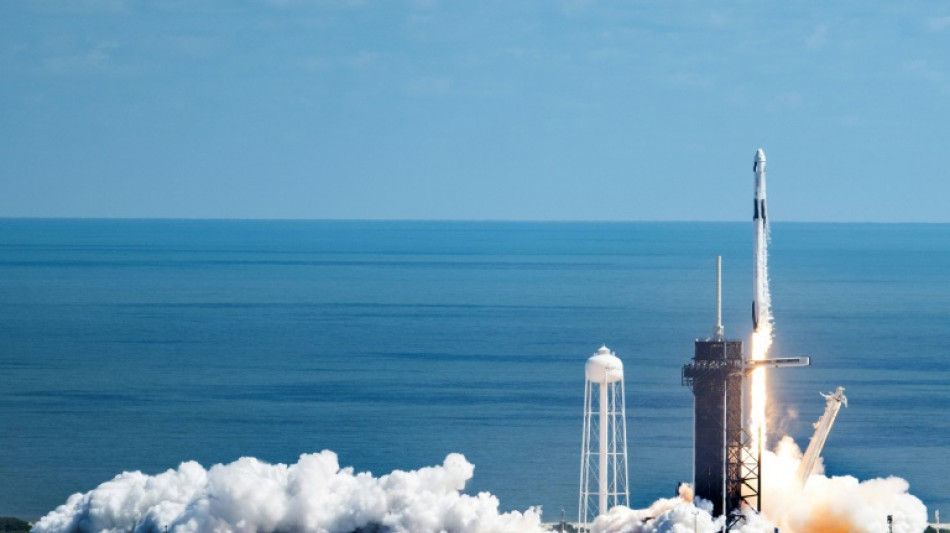

Amid Ukraine war, US flies Russian cosmonaut to ISS
A SpaceX rocket carrying a Russian crew member blasted off from Florida Wednesday on a voyage that carries significant symbolism as war rages in Ukraine.
Anna Kikina, the only female cosmonaut in service, is part of the Crew-5 mission, which also includes one Japanese and two American astronauts.
"Let's do this," said Nicole Mann, commander of the Crew Dragon capsule and the first Native American in space, shortly before liftoff from the Kennedy Space Center in Florida at noon.
Docking is scheduled for Thursday at 4:57 pm Eastern Time (2057 GMT).
Two weeks ago, an American astronaut took off on a Russian Soyuz rocket for the orbital platform.
The long-planned astronaut exchange program has been maintained despite soaring tensions between the United States and Russia since Moscow's invasion of Ukraine in February.
Ensuring the operation of the ISS has become one of the few remaining areas of cooperation between the United States and Russia.
In a post-launch briefing, Sergei Kirkalev, head of the human space program at Roscosmos, hailed the occasion as the start of a "new phase of our cooperation," evoking the historic Apollo-Soyuz mission of 1975, a symbol of detente at the height of the Cold War.
Kirkalev, a former cosmonaut respected by his American colleagues, has been on something of a charm offensive after the last head of Roscosmos, Dmity Rogozin, earlier this year threatened to withdraw cooperation and let the ISS crash over US or European territory.
While Russia has announced plans for its own station, analysts believe it would be difficult to build in the next few years, and withdrawing from ISS would effectively ground Moscow's civilian space program.
- Fifth female cosmonaut, first Native American -
Kikina, 38 and an engineer by training, is the fifth Russian female professional cosmonaut to go into space.
"I hope in the near future we have more women in the cosmonaut corps," the Novosibirsk native told AFP in August.
The Soviet Union put the first woman in space, Valentina Tereshkova, in 1963, nearly 20 years before the first American woman, Sally Ride. Since then, the United States has flown dozens more women.
It is also the first spaceflight for American astronauts Mann and Josh Cassada, but the fifth for Japan's Koichi Wakata.
Mann is the first indigenous woman to go to space with NASA. According to her NASA biography she is registered with the Wailacki of the Round Valley Indian Tribes.
She holds a Master's degree in mechanical engineering from Stanford, served as a test pilot in the F/A-18 Hornet and Super Hornet, and flew 47 combat missions in Iraq and Afghanistan.
- ISS future unclear -
Kikina is the first Russian to fly with Elon Musk's SpaceX which, along with Boeing, has a "taxi service" contract with NASA.
Musk himself waded into the conflict by proposing on Twitter a peace deal that involved re-running, under UN supervision, annexation referendums in Moscow-occupied regions of Ukraine and acknowledging Russian sovereignty over the Crimean peninsula.
The post enraged Ukrainians, including the country's envoy to Germany, who responded with an expletive.
Tensions between Moscow and Washington have increased considerably in the space field after the announcement of American sanctions against the Russian aerospace industry, in response to the invasion of Ukraine.
Russia announced this summer that it wanted to leave the ISS "after 2024" in favor of creating its own station, albeit without setting a precise date.
Kirkalev declared Monday he hoped to extend that date.
On Wednesday he went further still, telling reporters: "We are thinking about building (a) new space station. We start preliminary design of it.
"And there is no final decision yet but we are going to keep flying International Space Station as long as our new infrastructure will build."
The United States, for its part, wants to continue operating until at least 2030, then transition to commercially run stations.
B.A.Bauwens--JdB



